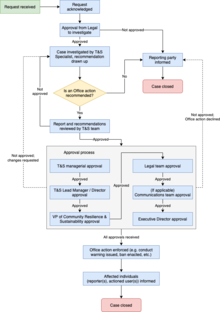事務局行動の方針
このページはウィキメディア財団の公式方針でもあり、ジミー・ウェールズが定めたもので、財団が管轄するサイトの運営に必要なものとして財団が承認しています。
| このページの要旨: ウィキメディア財団はサイトまたはコミュニティが定めた通常の(複数の)手順を経ることなく、特定のページを削除または保護または白紙化または別の行動を取らざるを得ないことがあります。それらの変更は法的な脅迫または個人に対する脅威の防止を趣旨とし、一時的または恒久的であり、いかなる利用者も取り消すべきではありません。 |
事務局行動の方針は、コミュニティや一般市民から苦情を受けた場合、あるいは法的に要求された場合に行うウィキメディアプロジェクトにおけるコンテンツの公式な変更・削除、またはウィキメディア財団の職員が財団の権限のもとで行う特定の個人への行為に関する措置に関する一連の指針と手続きです。事務局行動を行う可能性のある苦情には、プライバシー侵害、児童保護、著作権侵害、嫌がらせなどが含まれますが、これらに限定されません。すべての事務局行動は利用規約に従って行われます。
目的と適用範囲
この方針の目的は、ウィキメディアコミュニティのメンバー、ウィキメディア運動そのもの、そして一般市民の安全性について、ローカルコミュニティでの統治が不十分または不可能な場合に、その改善を支援することです。利用規約で説明されているように、すべてのウィキメディアプロジェクトではローカル方針が第一であることに代わりはなく、事務局行動はそれらのローカル方針を補完するものです。しかし、ウィキメディア財団がローカル方針を覆さなければならない稀な場合もあります。例えば有効かつ強制力のある裁判所命令に従い、ローカル方針上は問題ないコンテンツを削除する場合や、ウィキメディアコミュニティや公衆の安全を守る場合などです。
この方針の中で説明または言及されている行動の中には、ウィキメディアコミュニティやローカルでも行われる行動を含む場合があります。この方針で言及されるすべての行動は財団によって行われる行動を指し、コミュニティによって行われる同等の行動は特に明記します。例えば本方針での"グローバル追放"や"イベント追放"という用語は、ウィキメディア関連団体やコミュニティによって行われる同様の追放措置ではなく、それぞれ財団によって執行されるグローバル追放やイベント追放を指します。
主な事務局行動
ウィキメディア財団は、ウィキメディアプロジェクトにおけるコンテンツや行動について編集的・監督的な統制を行いません。これらの作業は、当財団の利用規約に従って、私たちの運動の教育的目標のための独自の方針を策定するボランティアで構成される自律的なコミュニティによって行われています。しかし、ローカルコミュニティの行動が効果的でない場合、および/または法的な点から私達が介入する必要がある場合は、必要に応じて事務的行動を行う場合があります。
グローバル追放は、利用規約に従って、利用者、一般の人々、またはプロジェクトの安全に対する不正行為や重大な脅威に対処するために財団が講じうる最も厳しい措置の 1 つです。これは主に、ウィキメディアプロジェクトの利用者の実際の安全性と認識される安全性を確保し、貢献や対話を妨げる禁止行為を防止するために実行されます。財団がグローバル追放を実行する可能性のある状況には、以下のものが含まれますが、これらに限定されません。
- 利用者が複数のプロジェクトで他の利用者に対して重大な、または度重なるハラスメントを行なう場合。
- 利用者がウィキメディアサイト外で、他の利用者を精神的または身体的に脅迫する目的で、重大な、または度重なるハラスメントを行う場合。
- 利用者が財団の他の利用者または従業員の信頼や安全を危険にさらす、著しく損なう、またはその他の方法で脅かす場合
- 利用者がウィキメディアのサーバー上で違法コンテンツをホストするなど、財団の利用規約を繰り返し、または著しく違反する場合。
- 利用者がウィキメディアのインフラストラクチャーの安全性を脅かす、または危険にさらす場合
方針とガイドライン
グローバル追放は、個人を、その人自身、または他者の代理人として、ウィキメディア財団のすべてのウェブサイト、プラットフォーム、活動から追放するものです。これには、www.wikimedia.org に掲載されているサイト、財団が主催するメーリングリスト、ウィキメディアクラウドサービス、ファブリケーターなどのウィキメディア技術インフラストラクチャー、および財団が主催もしくは協賛する対面イベントが含まれますが、これらに限定されません。したがって、財団によってグローバル追放された個人は、ウィキメディア財団の明示的な許可なしに、それらのサイト、プラットフォーム、リストにあるいかなるコンテンツにも参加、編集、投稿、その他の方法で変更を加えることはできません。
グローバル追放は、特定のユーザー名に対してではなく、個人に対して行われます。そのため、個人が管理する可能性のある代替アカウントや、追放措置が施行された後にその個人が作成する可能性のあるアカウントにも適用されます。また、追放された個人が使用している、または将来使用する可能性のある匿名/「IPアカウント」にも適用可能です。
グローバル追放は最後の手段とみなされ、苦情の受領、調査、徹底的な検討、および複数の財団職員による明示的な承認があった場合にのみ実施されます。グローバル追放措置により、ウィキメディアのプロジェクト、ウェブサイト、プラットフォーム、活動へのすべての関与は、執行された瞬間から禁止されるため、定義上は、追放された個人の将来的な関与も、ポジティブとなる可能性があっても、関与の結果に関係なく禁止されます。グローバル追放となった個人の投稿を故意に助長したり、そのような個人の代理として行動したり、財団職員やボランティア管理者、ビューロクラットやファンクショナリィがローカル方針に沿ってグローバル追放を執行するのを妨害しようとしたりすると、上位ユーザー権限の喪失やウィキメディアサイトへの投稿アクセスの停止を含む制裁を受けることがあります。グローバル追放措置は深刻なケースにのみ適用されるため、その期間は通常、無期限となることが見込まれます
財団イベント追放は、ウィキメディアの対面イベントに参加する利用者の実際の安全性と認識される安全性を向上させるために実行される事務所行動です。悪用や、ボランティアや利用者の信頼と安全を損なうような行為など、例外的な状況に対して実行されます。財団イベント追放は次のような状況に対して実行されますが、これらの例に限定されません。
- 利用者が対面イベント中にハラスメント行為やその他の悪質行為を既に行った、または行うと脅迫している場合。
- 利用者が悪意を持って対面イベントに参加したり、ウィキメディアの使命とビジョンを追求するための議論や協働作業を組織的に妨害したりする意図を既に表明または示唆している場合。
イベント追放は、ウィキメディア財団、または場合によっては関連団体(ムーブメント提携団体やパートナーなど)が主催もしくは協賛するオフラインイベントへの個人のアクセス、出席、および/または参加を制限するものです。これは財団だけが行う措置ではありません。ローカルのウィキメディアコミュニティも、追放がオフラインイベントに参加するコミュニティメンバーと利用者の信頼と安全の維持に役立つと判断した場合、関連方針 に基づいてイベント追放を実施する場合があります。財団が課すイベント追放は、提携する運動組織が策定・遵守する基準とは異なる基準に従っていますが、それらを補完することを目的としています
ローカルイベントから追放された者も、自動的にすべてのグローバルイベントから追放されるわけではありません。あるイベント追放の条件は、別のイベント追放の条件と異なる場合があり、複数の変数に左右されることもあります。例えば、財団イベント追放とは、以下の可能性があります。
- 特定の場所に限られる。ある都市やある国など、特定の地域内で開催されるすべての対面イベントへの参加から追放される場合があります。
- 特定のプロジェクトに限られる。メディアウィキ、ウィキプロジェクト、英語版ウィキペディアなど、特定のプロジェクトや言語プロジェクトでの作業や共同作業に関連するあらゆるイベントから追放される場合があります。
- 特定の期間に限られる。イベント追放は必ずしも無期限とは限らず、特定の期間にのみ課せられる場合もあります。
イベント追放は、その目的が達成されたと判断された場合に解除されることがありますが、追放された利用者による悪質行為が続いた場合、財団は追放措置を拡大する決定を下すことがあります。イベント追放の通知に具体的な期限が記載されていない、または取り消し不能である旨の記載がある場合、ca@wikimedia.org に異議申し立てを送信することができます。(グローバル追放の一部である、またはグローバル追放につながるイベント追放は、異議申し立ての対象になりません。)
イベント追放は、対面イベント中に特に発生した、または発生する可能性のある利用者の行為に関して財団に苦情が寄せられた場合に課されるため、グローバル追放の一歩手前となる場合があります。ただし、イベント追放につながった問題がオンライン上のやり取りや行動において懸念されるものでない場合、イベント追放は単独で存在することがあります。
上記および財団のイベント追放方針に従い、イベントへの出席を明示的に(イベント追放により)または暗示的に(グローバル追放により)追放された個人の氏名または仮名は、イベント追放リストという形で、イベント組織チーム/安全空間委員会/国・地域別協会内の指定されたチームまたは個人に提供されることがあります。このリストには、個人の識別に役立つ写真など、入手可能であれば、より詳細な識別情報が含まれる場合があります。
財団は、著作権侵害の事例を報告し解決するために、まず既存のコミュニティ主導プロセスの活用を検討することを推奨しています。これは、ウィキメディアボランティアのメール対応チーム((VRT), info@wikimedia.org )に連絡し、コンテンツの削除に関する非公式な要請を送信することで実行できます。この要請には、報告する著作物の場所や、著作権の帰属および当該著作物の使用の合法性または違法性を証明するのに役立つ情報など、要請を裏付けるすべての関連情報を含めます。
場合によっては、財団は正式な DMCA テイクダウンプロセスを通じて、ウィキメディアプロジェクトからコンテンツを削除する旨要請を受けることもあります。財団は、DMCA 通知に対応する前に、受領した DMCA 通知をすべて審査し、DMCA および米国著作権法の要件に準拠していることを確認します。私たちは法的に有効ではないと思われる通知は却下します。財団の法務チームが要請を確認した後、削除自体は通常、サポートと安全チームのメンバーがスタッフアカウントを使用して実行します。透明性の精神に則り、財団は DMCA テイクダウンを行うたびに、本ページ(コモンズに基づく要請についてはコモンズにもミラーリング)を通じて、また年2回の透明性報告書の集計統計を通じて、ウィキメディアコミュニティに報告します。
有効な DMCA 通知の受領に基づく著作物の削除に対して、反論することができます。こうした著作物を復元するための手段は、財団に反論通知を提出することです。反論通知を提出した場合、その著作物の所有権帰属を決定するために、苦情を申し立てた当事者との間で法的手続きが行われる可能性があることにご注意ください。DMCA プロセスでは、米国の裁判所の管轄権に同意する必要があります。財団が対応したテイクダウン通知に法的根拠がないと思われる場合は、反論通知の提出方法を知るための第一歩として、次のサイトをご覧ください。
- Lumen 著作権 FAQ
- Lumen DMCA 通知 FAQ
- Lumen DMCA 公正使用を主張する反論通知
- EFF のDMCA 関連情報
- DMCA テイクダウン通知への対応に関するデジタルメディア法プロジェクト
- 著作権で保護された作品の公正使用を主張する場合の、New Media Rightsによる DMCA 反論通知サンプル
- 米国著作権局
すべての事務所行動と同様、DMCA 通知に基づくテイクダウンについても、適切な法的理由なしにこれを元に戻すことは厳に控えてください。ウィキメディア財団は方針として、適切な状況においては、侵害行為を繰り返し行う者のアカウントをデジタルミレニアム著作権法(17 U.S.C.512)の規定に従い停止します。ほとんどの場合、投稿したコンテンツが DMCA の苦情の結果として削除されたという通知を受け、その削除を元に戻した利用者のアカウントも停止されます。
私たちにとって未成年者の安全は極めて重要であり、それを保証するためのあらゆる努力を払っています。そのため、未成年者が危険にさらされていると判断した場合は、直ちに措置を講じます。これらの措置は、児童虐待を助長する行為とコンテンツの両方を軽減することを目的としています。児童虐待は、ウィキメディアプロジェクトのコンテンツの一部として教育的に議論されることはありますが、宣伝目的や刺激的な目的で議論されることは決してありません。
大人と子どもの不適切な関係を求めたり助長したりする行為は、ウィキメディアプロジェクトでは許されません。この種の活動には、児童ポルノや、適用法に違反する成人と未成年者の間の不適切な性行為を描写した素材の投稿、適用法で違法とされる未成年者に対するわいせつな素材の配布または不正売買、ウィキメディアプロジェクトを通じて未成年者と連絡をとってグルーミングしようとする行為、グルーミング目的でウィキメディアプロジェクト外のプラットフォームに連絡の場を移そうとすること、ウィキメディアの対面イベント中に未成年者に不適切にアプローチしようとする行為などが含まれますが、これらに限定されません。一方、学校関連のエディタソンを企画および運営する目的での連絡は許容されます。オンライン上の児童搾取の撲滅に対する財団方針の詳細は、こちらをご覧ください。
子どもの安全に関する懸念事項は検討され、優先的に適切な措置が講じられます。非公開のユーザー情報の要求を通じて私たちに知らされた情報を含め、児童ポルノであると思われる事例は、財団のユーザー情報の要求に関するガイドと手順に従って、全米行方不明・被搾取児童センター(NCMEC)に報告されます。要求がすでに NCMEC に報告されている場合、または NCMEC が処理している事例に関連している場合は、要求に当該事例または報告情報を含めてください。財団は、そのような行為への関与が判明した個人に対し、ローカルまたは国際的な法執行機関に警告を発するなど、追加的な措置を取ることもあります。
二次的な事務局行動
このセクションに記載されている措置は、通常、別個の報告書を評価した結果として、財団の裁量で実施されます。これらの措置に関する直接的な要請は、通常、適切なコミュニティガバナンスメカニズムに委ねられます。財団はこれまで、特別な状況下でのみこのような措置を講じてきました
行動警告は、ある状況が問題であると判断された場合に発行され、事態のエスカレートを防ぐための措置です。これは、余裕が十分にあると判断された段階での、事態の軽減を図る措置とみなされています。この警告は、行為者自身は問題ないと思っている行為が、実は容認できないものであるということを本人に伝えて反省する機会を与え、是正措置を取るよう促して、その行為を減らし、最終的には止めさせるためのものです。
行動への警告は通常、ある貢献者のオンラインまたはオフラインでの行動が、虐待的、破壊的、またはその他の方法で共同作業のプロセスを妨害する境界線上にあると判断されるものの、まだ是正措置のレベルに達していない段階で、財団が発行するものです。このような警告は通常、度重なる個人攻撃、編集/ステータス争い、なりすまし、その他不適切な対面での言動を含む、ただし、これらに限定されない行為の類に対処することを目的としています。
行動への警告がどの程度効果的であるかに関するデータは収集されておらず、ウィキメディア財団には、警告が発せられた個人に行動を是正する方法について継続的なカウンセリングを提供するためのリソースがありません。ただし、財団は積極的な貢献が有害行為を上回っているとは考えていないものの、イベント追放やグローバル追放による制裁を受ける可能性のある貢献者への礼儀として、警告が発せられる状況はあるかもしれません。警告は、複数の関係スタッフによる検討を含む徹底的な評価を行った後に初めて、秘密裏に発行されます。その意図は、個人を辱めたり、状況をエスカレートさせたりすることではなく、誠実を持って活動していると思われる貢献者に、制裁につながるような行動をやめる機会を提供することです。
極めてまれな状況ですが、財団は、ウィキメディアの職員や高度なツールにアクセスできる他の利用者による重大な信頼違反に関する状況や情報を知ることがあります。プライバシー上の理由により、そうした情報の一部またはすべてをウィキメディアコミュニティと共有できない場合があり、そのため、既存のコミュニティガバナンス機構を通じて処理することができません。こうしたケースの中には、報告された悪用がウィキメディアンをコミュニティから永久に追放するほどのレベルには至らなくとも、関与する個人に対するコミュニティの信頼を裏切るほど深刻であり、そのため管理者権限のはく奪が正当化されるケースもあります。
利用者権限の剥奪は通常、永続的または長期的なものです。信頼を回復することは不可能ではありません。だからこそ、上位権限者の権利はく奪に至るまでの自分の行動を振り返り、今後どのようにすればコミュニティに最も貢献できるかを考えるよう促されるのです。権利はく奪が長期間行われ、無権利期間が経過すると、貢献者は、上位権限の再申請が許可される前に追加の基準を満たさなくてはならない場合があります。この基準は、上位権限がはく奪される際に貢献者に通知されます。
財団職員による高度な権利の利用
不正行為の報告の評価中にウィキメディア財団が利用規約を遵守するために行う可能性のある管理上の措置は多岐にわたります。理論的には、コミュニティ内のボランティアによって実行されうるあらゆる管理措置が対象となります。財団はコミュニティの自治を支持、奨励しており、可能な限り最小限の措置しか取らないよう努めています。そのため、コミュニティからのこうした措置への要請を受け入れることは慣例となってはいません。
すべての管理者権限のうち、チェックユーザーは、ウィキメディアコミュニティの信頼と安全を確保するために、財団の信頼と安全チームによって最もよく使用される権限です。多くの場合、これはウィキメディアコミュニティのメンバー、貢献者、著名人、または一般の人々に対する危害の脅威に関する緊急報告の審査プロセスにおいて使用されます。また、ユーザー情報要求に関する手順とガイドおよび財団の個人情報保護方針に従って情報要求に応じる場合や、法的紛争(たとえば、財団を提訴している人物の主張の真偽を確認する場合など)や規制当局の調査に関連して使用される場合があります。また、グローバル追放を検討する際の長期悪用の調査に関連して、さらにグローバル追放の発行時にも使用されることもあります。最後に、グローバル追放措置を講じる際に、グローバル追放された利用者のものと疑われる複数アカウントに関する報告を確認するときにも使用する場合があります。いずれにせよ、チェックユーザーの実行だけでは、チェックの対象者が何か悪いことを犯したということを意味するものでも、証明するものでもありません。
チェックユーザーは、それが伝える情報の機密性が高いため、コミュニティとより広範なウィキメディア運動を保護する上で関連があり、また、それを取得する他の合理的な方法がない場合に限って使用されることに留意してください。財団は、チェックユーザー情報をコミュニティの非常に信頼できるメンバー(つまり、スチュワード)と共有することがありますが、情報を公開することで法執行機関による一般市民を守るための継続的な取り組みが妨げられたり、ウィキメディアコミュニティのメンバーが危険にさらされたりする場合は、当該情報を保留することを選択する場合があります。このアクションは、財団職員のアカウントを通じて実行されます。
ページ保護は、幅広い利用者が特定の記事やページを編集することを防ぐものです。これは、特別な権限の有無にかかわらず貢献者に影響を与える可能性があり、また、すべての貢献者に影響を与える「触れてはいけない」ルールを課す可能性もあります。財団ページの保護は、極めて稀な状況でのみ認められ、通常は裁判所命令、または利用者、職員もしくは一般の人々の信頼と安全に対する重大なリスクがある場合にのみ認められます。それ以外の場合は、ローカルプロジェクト方針に従って、コミュニティ機構によって対応されます。
本方針に基づき、あるページが保護されると、タグ「{{pp-office}}」がページ上の目立つところに配置され、ページは保護されます。疑わしい内容を削除するために記事が数文に短縮される場合がありますが、その後、加筆可能となり、より評判の良い状態にすることができます。これは、タグ {{reset}} (または {{pp|reset}} などの関連タグ)によって示され、全員が従うべき指示も表示されます。
範囲 IP ブロックの典型とはコミュニティが不正行為と混乱の低減を助けるために採用する行動です。しかしながら、事案によっては利用規約を保ちつつ、財団がグローバル追放を実施するためにこのブロックを課することがあります。
範囲ブロックは、IP アドレスのグループがウィキメディアプロジェクトで活動的になるのを防ぎます。範囲ブロックされた IP は、アカウントの作成、プロジェクトの編集、オン-ウィキの機能を通じた他の貢献者への連絡などができなくなります。
グローバル追放の過程で範囲 IP ブロックを実施する場合には、財団事務局アカウント(WMFOffice)の元に行います。 その他の状況においては、職員アカウントを介して実施します。
事務局行動の要請
事務局行動の検討要請は、特定の措置に関する権限を持つ財団チームに提出する必要があります。これは、信頼と安全チームまたは法務チームとなります。要請は最初、財団の他のチームや職員に送られても、その後適切な宛先へ転送されますが、より迅速に審査が行われるよう、上記の連絡ルートのいずれかを通じて直接送付することが最善です。
要請が検討されるためには、次の内容が含まれていることが重要です。
- 求める措置を明示的に指定する。
- 要請理由の簡潔な要約を含める。
- 該当する場合や可能な場合には、ローカルコミュニティのガバナンス機構を通じてその問題を解決しようとする試みがすでに行われてきたことを示す証拠(URL)を提供する。
- 該当セクションで詳述される特定の措置要件に従い、関連文書等、要請を裏付ける重要な情報および証拠を含める。
事務局行動の実施者とは?
事務局行動は財団職員または請負業者によって厳密に実行されます。これらの担当者は、ウィキメディア財団を代表または代理する者によって、通常は財団の法律顧問、財団の特定の事務局職員の指示に従い、もしくは当該事務局行動に関連する個々の方針の規定に従って、権限を与えられます。
通常、事務局行動を行う財団職員は以下の通りです。
- ロールアカウント WMFOffice
- 職員のユーザーアカウントを持つ信頼と安全チームのメンバー。
事務局行動は通常、ユーザー名 User:WMFOffice のロールアカウントから行われます。DMCAテイクダウンを実行するなど、場合によっては、事務局行動は職員アカウントによって実行されることがあります。いずれの場合も、曖昧さを避けるために、実行中も実行後も明確に示されます。
ウィキメディア管理者、および事務局行動を差し戻したり編集したりする技術的権限を持つその他の者には、そのようなことをしないよう強く警告します。事務局行動に対する不正な変更は、元に戻されるだけでなく、関与した個人の権利のはく奪など財団による制裁につながる場合があります。疑わしい場合、コミュニティメンバーは、事務局行動を行った財団職員またはその直属の上司に相談します。ただし、事務局行動に関する詳細は、利用者、一般の人々またはプロジェクトの安全を損なわない範囲でのみ共有されます。
事務局行動の時系列

個々の事務局行動要請は、その対象となる人物と同様、他に同一のものが存在しません。これは特に行動の問題に関する要請に当てはまります。コンテンツ関連の措置はより単純となる傾向があります。さらに、本方針に記載されている各措置は、様々な内部プロセスの対象となります。要請された措置が正当かどうかを判断するために評価を行うのではなく、報告された行為を評価した結果である場合もあります。
このような理由から、一般的な事務局行動に定められた期限はありません。ただし、私たちはできるだけ早く対応し、以下のタイムラインガイドラインを遵守するよう努めています
- グローバル追放:4週間
- イベント追放:4週間
- DMCAコンプライアンス:7営業日
- 児童保護:24時間
私たちは上記のタイムラインガイドラインを遵守するよう努めていますが、事務局行動の要請が評価され、承認されるまでに、はるかに長い時間がかかる場合があります。当初の要請に関する追加情報や新たな情報を受領した場合、評価中に要請が大幅に拡大した場合、またはその他の不測の事態により、評価の遅延が生じることがあります。
反論
事務局行動、もしくは事務局行動を行わないという財団の決定に対しては、最初の発行から 6 か月以内に、または事務局行動の実質的かつ非定型的な変更(たとえば一時停止期間が数ヶ月延長されても新たな不服申し立ての権利の発動にはなりません)があった場合は法律顧問の承認を得て、異議申し立てをすることができます。
ある事案に直接関与する個人のみが、最初に対応を要請した個人として、または調査対象の個人として、審査を要請することできます。審査は、調査の終了時に、私たちの決定(すなわち、事務局行動を取るか否かの判断)に応じて要請することができます。
事務局行動に対する異議申し立ては、それが不適切である理由を明記の上、appeals@wikimedia.org にメールで送信します。
特定利用者の行動の詳しい調査に関連して実施された事務局行動については、ボランティアの信頼と安全事案審査委員会が設置され、対象となる信頼と安全の事務局行動に対する異議申し立てを審査しています。詳細は「信頼と安全事案審査委員会」のページに記載されています。
全般的な情報
一般論として事務局行動に関し、いくつかの点を明確にしておくことが重要です。
事務局行動は極めて稀。
ウィキメディアのプロジェクト群全体で行われる行動と、私たちの版(見解)と使命の追求において、かつ私たちの利用規約を追従するローカルのコミュニティの組織統治の機構主導の場合を比較すると、事務局行動の件数はごくごく少数です。
事務局行動は予防が可能。
事務局行動によって鎮静化されるすべての行為は、そもそもウィキメディアプロジェクトにおいて望ましくないものです。そのような行為が観察され、修正されれば(つまり、削除、中止、またはその他の方法で阻止された場合)、苦情を申し立てる理由はないのですから、苦情はなくなるでしょう。同様に、何らかの措置が取られる前に苦情が解決された場合、その後に事務局行動が行われる可能性は低くなります。
事務局行動は可能な場合は透明性を持たせますが、しかし安全(並びに法令遵守)を最優先します。
本方針に記載されているすべての事務局行動について、常に同じレベルの透明性を維持できるとは限りません。状況によっては、完全な、あるいは部分的な透明性でも、関係者のプライバシー権および/または安全を損なったり、進行中の警察捜査を妨げる可能性があるためです。私たちは可能な限り透明性を保つよう努めていますが、ウィキメディア利用者、一般の人々、プロジェクトを危険にさらすリスクがある場合は別です。
事務局行動は厳格な内部プロセスによって管理されます。
特定の事務局行動に透明性が欠けるからといって、それを実施する者の説明責任がなくなるわけではありません。内部プロセスやプロトコルの遵守が求められ、複数レベルの審査や明確な承認なしに実施されることはありません。最終的な事務局行動とそれを実施する際に遵守する内部プロセスに関する情報は、可能な限り共有します。
事務局行動は個人的な恨みに基づくものではありません。
事務局行動は、ウィキメディアプロジェクトのコンテンツについて、またはウィキメディアプロジェクト内で発生もしくはウィキメディアプロジェクトの貢献者の福利、信頼、安全に影響を与えている特定の悪質行為について、ウィキメディア財団に明確な苦情が寄せられた場合にのみ実行されます。場合によっては、法執行機関の要請に従い、または財団の方針執行プロセスの一環として調査が行われることがあります。これらの調査も所定のプロセスに沿って行われ、ウィキメディア財団階層の複数の職員による厳格な内部審査を受けます。
悪質な要請は受け入れられません。
私たちは、提出された正当な事務局行動要請すべてに誠意を持って、適切なコミュニケーションチャネルを通じて対応するよう努めます。ただし、要請自体が利用規約や友好的な空間またはその他の行動方針に違反するもの、または優遇措置(記事のコントロールなど)の要求を伴う要請は検討の対象外となります。私たちは、職員に対する威嚇、危害を加えるとの脅し、またはハラスメントとなりうるその他のコミュニケーションを容認しません。上記のいずれかの行為が認められた場合、かつ、警告した後も不適切な報告行為が継続する場合、報告者との連絡を一切拒否することがあります。このロックアウト期間は、悪質な報告の重大性、頻度、件数、および(合理的に明らかな場合は)推定される意図(明白な悪意など)に基づいて決定されます。
事後モニタリング。
財団は通常、実施した事務局行動に対する違反についてプロジェクトを監視することはありません。財団は、コミュニティの安全性と繁栄を維持するため、コミュニティの協力を頼りにし、そのような違反を信頼と安全チームに報告してもらっています。チームはケースバイケースで報告を審査し、適切な措置を講じます。
事務局行動の実施。
コミュニティの参加者は事務局行動の実施の補助を認められるものの、期待も義務化もされません。自ら選んで補助するならば、利用規約を支持する限りにおいても、これは懲罰行動や制裁であってはなりません。事務局行動の実施の補助は複数の方法があり、例えば交流を追放されたはずの投稿者が他の利用者とのやり取りをしようとブロック逃れに利用したソックパペットを通報する、グローバル追放中の利用者がアップロードしたコンテンツを除去する、イベント追放の利用者が出入り禁止になったイベントに参加しようとしている情報を知らせるなどです。
事務局行動または職員行動の濫用。
本方針に記載されている事務局行動が濫用されたと思われる場合は、ca@wikimedia.org に懸念事項を送信することができます。このメールアドレスは、不適切な行為や上位ユーザー権限使用など、職員アカウントによる不正使用の可能性を報告するためにも使用できます。
